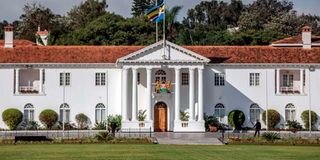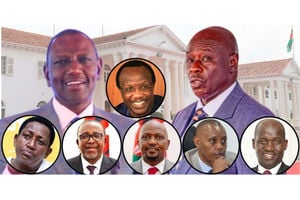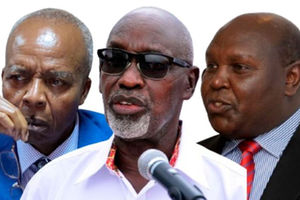
State House, Nairobi.
Contract details relating to several tenders awarded by State House were deleted, and then restored on a Public Procurement Regulatory Authority’s (PPRA) portal, raising questions over the move to hide data on financial spending at the house on the hill.
A Nation investigation had revealed that for at least seven days, all contract awards by State House were missing from the Public Procurement Information Portal (PPIP), where all government institutions are required to publish details of tenders they have awarded.
But hours after sending inquiries to State House and the PPRA on Tuesday, the contract details were restored on the PPIP portal late in the evening.
PPRA Director-General Patrick Wanjuki had earlier said that the contract award details for State House were unavailable on account of a system upgrade intended to block the public from viewing tenders awarded by security agencies like the police, Kenya Defence Forces and the National Intelligence Service.
Mr Wanjuki did not, however, clarify why the regulator was scheming through State House tenders as part of the review, as it is not a security agency.
Some experts had raised concern over the missing State House tender details, arguing that it risked lowering accountability, while promoting secrecy in public procurement.
A search for State House contracts on the portal, owned by the Public Procurement Regulatory Authority (PPRA), for the last seven days had returned zero results, indicating that the data has been erased or restricted to specific users with special access to the portal.
A spot check on other government institutions which published their contract awards on the portal did not return any result showing that their data may have been deleted or restricted.
For instance, disclosures in the portal for the 2022-2023 financial year in the past revealed that State House contracted Rempta Enterprises Ltd and Milroz Diesel Services to supply heavy-duty branded umbrellas for Sh3 million.
State House also contracted Imathere Investments to supply a digital watch worth Sh750,000.
In the financial year ended June, 2024 contracted Wiflo Agencies (Sh2.7 million), Rempta Enterprises (Sh1.3 million), Estelle Distributors (Sh1.9 million), Miliki Development Company (Sh1.8 million) and several other firms to supply furniture and do renovations.
While that data was available on the PPRA’s portal in April, 2024, it was missing from the PPRA’s database as recently as 5.30pm on Tuesday.
State House spokesperson Hussein Mohamed had not responded to our queries on the missing data by the time of going to press.
Government institutions, including State House, are required to publish all the contracts they have awarded on the portal for accountability.

Public Procurement Regulatory Authority (PPRA) Director-General Patrick Wanjuki.
Mr Wanjuki had earlier on Tuesday clarified that none of the contracts awarded by State House has been listed among those that will be classified, raising more questions as to why tender details for the house on the hill were still missing from the portal.
“They (State House contract details) were not deleted. The contracts could not be visible because we are working on an upgrade of the portal. With the upgrade we plan to make all the contracts by the security agencies not visible to the public. But my team has confirmed that none of the State House contracts are classified,” Mr Wanjuki.
While there is no express legislation that requires government institutions to make public their contract awards, the portal has for years been fed data on account of an executive order by former President Uhuru Kenyatta.
In the June 13, 2018 executive order, President Kenyatta ordered that at the start of the following month, which was also the start of the next financial year, all government institutions publish details of contracts awarded, and beneficial owners of the firms hired.
Four months earlier, High Court judge Chacha Mwita had declared section 40 of the Public Audit Act, which created different rules for probing books of accounts of the Kenya Defence Forces and other national security organs like the National Intelligence Service (NIS).
Transparency International
The move followed a petition by Transparency International, which argued that section 40 of the Public Audit Act clipped the Auditor-General’s powers to audit public spending in security organs.
Kwame Owino, an economist and CEO of the Institute of Economic Affairs, said that the deletion is a concern as it takes Kenya back to the dark days of secrecy in tender awards, and also makes it difficult for the public to hold institutions accountable.
The economist argued that the Office of the President and State House got among the biggest development allocations in the recent supplementary budget, and that their spending should be open to public scrutiny.
“To take down existing data from a website is very deliberate. It is a bad signal. It would be one thing to say that information on awarded contracts has not been uploaded because of a backlog, which would still be wrong. But when historical records are being deleted, especially in light of some of the Auditor-General’s findings, this becomes very worrying,” Mr Owino said in a phone interview on Tuesday.
The contract publishing requirement stems from a June, 2018 order by former President Uhuru Kenyatta, whose directive was aimed at increasing accountability in procurement processes at both national and county government levels.
Designated administrators in each government institution are given specific rights to the portal, related to publishing, editing and deleting information on awarded contracts.
In 2020, the IMF directed Kenya to publish tender awards and beneficial owners of contractors on the PPRA’s portal, as a condition for a Sh467.5 billion loan.
As the multi-year programme that Kenya had with the IMF comes to an end, the government has been slowly rolling back some of its stringent conditionalities, including the requirements to lay bare all the details of suppliers who win public contracts to ensure transparency and accountability.
The programme, through which Kenya was to get a total of Sh467.5 billion in loans, required state corporations to start publishing details of people who benefit directly from the companies that win Government tenders, or beneficial owners, as a condition for accessing the credit facility.
Because public procurement is one of the government activities most vulnerable to fraud, the global financier reckoned that ensuring transparency and accountability in the process would help the country reduce its high fiscal risks by ensuring that taxpayers get value for money.
The push to have state corporations publish all the details of their suppliers on the public procurement information portal started with the controversial Covid-19 expenditures that saw the country lose billions in one of Jubilee’s biggest scandals.
The publication of the names was supposed to unmask some of the shadowy wheeler-dealers that lined their pockets at the expense of taxpayers who had been hit hard by the adverse effects of the pandemic.
Priority
"This key planned step should be implemented as a matter of priority," said the IMF, putting the deadline for this directive to the end of June 2021.
Kenya was initially supposed to start publishing beneficial ownership information, or details related to the identity of individuals with a shareholding of more than 25 percent, by the end of June 2021.
However, this was delayed with the government explaining that it did not yet have the right legal framework to reveal such data.
Around this time, the government desperately needed cash to weather the Covid-19 storm that had wiped out a big chunk of the country’s reserve of dollars due to reduced tourism earnings and exports, which are critical foreign exchange earners.
As a condition for Kenya to receive financing from the IMF required the Kenya Medical Supply Authority (Kemsa) was required to publish in the PPIP details on shareholders of companies that had been contracted to supply it with protective equipment.
Kenyan officials, starting with the former administration of President Uhuru Kenyatta, were cagey about publishing such information as directed by the Washington-based global financier. But with the IMF piling pressure, a few government institutions started publishing details of the contracts on the portal.
The pressure was more for the new Kenya Kwanza administration, which desperately needed the dollars, and the programme, from the IMF to help it pay the $2 billion Eurobond that was to mature in June 2024.
Thus, some efforts were made to publish the contracts won as well as their beneficial owners on the portal. According to the PPRA a total of 1,476 contracts worth Sh77.9 billion, had beneficial ownership information published through the PPIP as at May 2023.
However, around this time an analysis of a sample of 12 companies—owned by individuals with close links with the Kenya Kwanza administration—showed that details of the contracts recently signed with various State agencies had not been published as required, pointing to heightened opaqueness in public procurement.
In total, these companies had in the last nine months won government tenders valued at over Sh22 billion, a big chunk of which was supplying various commodities to the Kenya National Trading Corporation (KNTC) in what was aimed at reducing the prices of food.
This omission caught the attention of the IMF. “Continued low level of reporting of beneficial ownership information by companies is hampering effective implementation of the beneficial ownership framework,” said the IMF in its July 2023 report on Kenya.
Disclosures from the portal have revealed how Weston Hotel, owned by the family of President, had at some point been beaten other Nairobi hotels in bagging the most hospitality contracts.
The US’s African Growth Opportunity Act (AGOA), and the Strategic Trade and Investment Partnership (STIP) also had requirements for Kenya to fight corruption by, among other things, making public all tender information.
Both programmes are in a wait-and-see trance as countries across the globe monitor the full effect of US President Donald Trump’s “America first” policy shift.













